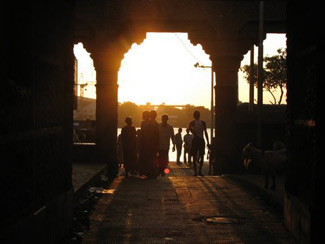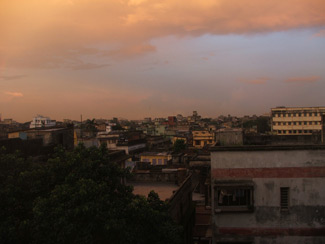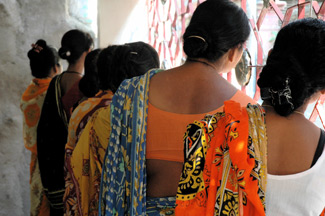It is estimated that there are more than sixty thousand
brothel-based women and girls in prostitution in Kolkata.Pinky stood at the entrance to the narrow, crowded main lane of Sonagacchi, the largest red light district in Kolkata, India. She was waiting among other young girls standing the line. (In India, working in the sex trade is often referred to as “standing the line,” because the women literally line up along the street waiting for customers.) Pinky’s hair was cropped close and her eyes glassy with unshed tears. The raw look of shame and fear spoke of her vulnerability and drew me to her. I asked her where she was from and how long she had been in Sonagacchi. She told me the story of losing her mother and how her father was now also very sick and she needed to support her younger brothers. With tears, she said she had only been on the line for ten days. Unlike many of the girls I had met previously, Pinky had not been trafficked; instead, she was offering her body as a solution to desperate poverty.
I walked away from Pinky carrying her desperation as my own. Crying out to God, I lamented Pinky’s situation and voiced my anger that no place existed for a girl like this to find a job and support her family without selling her 16-year-old body. I found myself feeling hopeless, paralyzed, wondering how in a place of such deep and profound bondage there could be freedom. I asked God for a vision, for radical hope with tangible actions that would give fair job choices to girls like Pinky and a safe place where life could be made new.
A short five-minute walk from our home, our small community continues to find ourselves walking down the main lane of Sonagacchi and sharing life with girls like Pinky. We walk through the doors of brothels as if we belong—up the dark, filthy stairs into very small but well-kept rooms of women we have come to call friends. As a community of believers, North American and Bengali, we have been seeking the incarnation of Jesus in the red light area of Songacchi for more than six years.
The women of Sonagacchi and Kalighat, a smaller red light area, are the daughters, sisters, mothers and wives of the poorest of the poor in the villages of West Bengal, India, Nepal and Bangladesh. They have found themselves at the doorsteps of these brothels because of poverty, trafficking and trickery. Some of them married the wrong boy and found themselves here when they could not bear children. Some heard the promise that appeals to the ears of every girl in desperate poverty: “You can have a good paying job as a nanny or housecleaner”—but then found themselves under the firm hand of a madam, working for years to pay a debt for their own lives. One mistake led them to the door of a brothel and into a life that many feel they can never leave.
Numbers Become Neighbors in Need of Redemption
According to Jose Vetticattil and Sunitha Krishnan, “Although exact numbers are not known, it is estimated that there are more than sixty thousand brothel-based women and girls in prostitution in Kolkata.”1 Seven thousand of those women are living their lives in the red light area called Sonagacchi.2 The lanes are also filled each day with an additional three thousand women who come in from the villages up to three hours away searching for an answer to the hunger in their children’s bellies.3 These women, called flyers, offer themselves out of circumstances of desperate poverty for rice and school fees. Humanity in the red light area is numbered by gender. The statistics do not tell the whole story because they only relate the women who live in this place; they forget the children and the men who find themselves partnered in bondage to the sex trade which is plied within its boundaries. ![]()
|
|
The numbers are now our neighbors and they have become people and stories that have compelled our vision for freedom. The assault on human dignity is devastating in the red light area and yet we cling to the hope that the women of Sonagacchi can have freedom, that dignity can be restored and that the streets which are lined with women in slavery can be made new. Through long-term relationships, we believe that red light communities like Sonagacchi and Kalighat can be transformed.
Biblical Restoration
God proclaims in Revelation 21:5 that he will make all things new. It is this future hope and promise of life being made new in Christ that compels our community to seek freedom for the red light areas. We believe and are seeing that Jesus makes life new for the women and their families.
As a community, we also cling to the words of Isaiah 58, which is full of promises for those who submit to the difficulty of the chosen fast and for those who actively seek the breaking of chains and setting the oppressed free:
“Is this not the fast which I choose, to loosen the bonds of wickedness, to undo the bands of the yoke, and to let the oppressed go free, and break every yoke? Is it not to divide your bread with the hungry, and bring the homeless poor into the house; when you see the naked, to cover him; and not to hide yourself from your own flesh?
And if you give yourself to the hungry, and satisfy the desire of the afflicted, then your light will rise in darkness, and your gloom will become like midday. And the LORD will continually guide you, and satisfy your desire in scorched places, and give strength to your bones; and you will be like a watered garden, and like a spring of water whose waters do not fail. And those from among you will rebuild the ancient ruins; you will raise up the age-old foundations; and you will be called the repairer of the breach, the restorer of the streets in which to dwell. (Isaiah 58:6-7, 10-12)
The challenge of the fast is culminated with the promise in verse 12: “You will rebuild the ancient ruins; you will be the repairer of the breach and the restorer of streets with dwellings.” It is a promise for the transformation of our neighborhood, a red light area, which is in desperate need of restoration.
Word Made Flesh in Kolkata
The Word Made Flesh community in Kolkata is made up of connectors and developers. We spend hours a day on the streets, talking with the girls, their owners, their lovers. Time is shared in the brothel rooms drinking tea and listening to the stories of loss and betrayal. Together, we hunch over notebooks, teaching Bengali literacy or spoken English, all for the sake of relationship. Our time is offered by both showing and telling the women that their lives have value and that they are loved by God. ![]()
|
|
The girls and women of Sonagacchi and Kalighat are reminded that they have choices. The community supports and partners with the girls as they go to hospitals for tests and treatments for HIV. We also resource them with other organizations who can give them long-term support. New jobs are offered at businesses and NGOs (Non-Governmental Organizations) that are hiring women specifically from the red light areas. Our community makes an offering of time so small seeds of trust are planted that might one day grow into a life of holistic freedom. Our hope is to meet the women and their families where they are, in the place where they live and work. Our hearts' desire is that one day each girl, woman, child and man would have a life made new, redeemed.
Freedom Through Sari Bari
Although I have never seen her again, Pinky’s face remains engraved on my heart. It is her face and the faces of many others that our community has come to love, that we think of when a new woman walks through the door of our business initiative called Sari Bari. Sari Bari is not only the answer to my lament for Pinky, but also the answer to the prayers of the Word Made Flesh community in Kolkata, and more deeply, to the unheard cries of the girls in the red light areas of Sonagacchi and Kalighat. At Sari Bari, women earn a living by making bags and blankets.
We see Sari Bari as a means by which life can be made new through employment in a safe, loving community among women from similar circumstances who are walking through exodus to freedom. We are privileged to see twenty-two women in two red light areas taking the road to a new life though Sari Bari.
The hope of life being made new was planted in our hearts for the women many years ago and the women in turn are planting the seeds of freedom in the hearts of the women with whom they share space in the brothels. We started Sari Bari with three women. We spent a year pouring into their lives emotionally, spiritually and tangibly through education and job training. The women who work for Sari Bari remain in their rooms in the red light areas and are able to maintain accountability with one another to stay out of the trade as well as continue in community friendships. The first three women brought eight more women through the doors of Sari Bari. We have seen the same story repeated in another area. One young woman who was working at our partnering unit moved into a new brothel to pay cheaper rent as she worked to get out of the trade. She invited the whole brothel to come and have a new life. Six women came and are still working today and those women have now brought their neighbors from the brothel next door.
These red light communities are being transformed, woman by woman, brothel by brothel. We hold close our dreams that one day what we now call a red light area will stand as a profound testimony to the transformation of a community of people.
My friend Kerry, who inspires a business for women coming out of the sex trade, will often single out a woman and ask her, “What is our business?” I have never heard a girl answer with anything but a single word—“freedom.” It is a word that all the women we work with both in the trade and out of the trade understand. Kerry is in the business of freedom, the girls may sew bags with their hands; however, in their hearts they are working for and living out a life of freedom. We are all in the business of the Master, the business of making things new. From the darkest lanes and most horrible circumstances, freedom and newness is coming in conversations over hot tea, in those tentative steps toward a different job, in the hands that sew beauty into blankets and bags, in the lives that become new as they walk into the arms of Jesus.
Endnotes
1. Vetticattil, Jose and Sunitha Krishnan. 2002. The Shattered Innocence: A Field Study on Interstate Trafficking for Commercial Sexual Exploitation from Andhra Pradesh. Hyderabad, India: Prajwala Anti-Trafficking Cell. 42.
2. Sankar Sen, P.M. Nair, Ips. 2006. Trafficking in Women and Children in India. Hyderabad, India: Orient Longman Private Limited. 672.
3. Ibid. 672.




